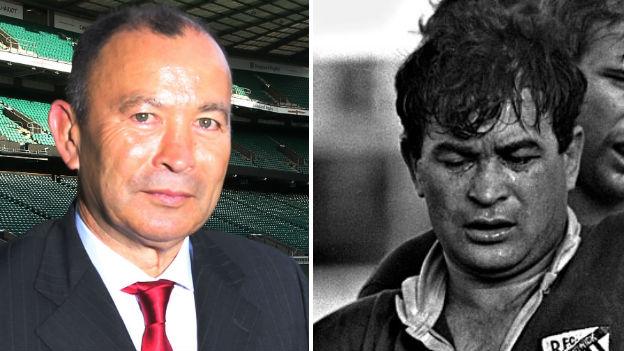Six Nations 2017: The moments that defined England's rise and the ones to come
- Published
- comments
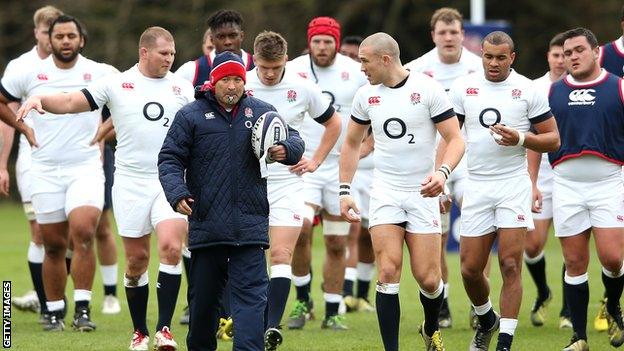
England have won their past 14 Tests, 13 of which have been under Jones
Six Nations 2017 |
|---|
Dates: 4 Feb-18 March Coverage: BBC TV, Radio and online |
By the end of the Six Nations, England could have won a second Grand Slam in a row and set a new record for the most consecutive wins in the history of Test rugby.
The key date may well be 18 March, when Ireland host England in a potential Grand Slam decider.
But England know they face tough battles before that, notably against a resurgent France on 4 February and the difficult trip to Wales on 11 February.
If England are to win consecutive Slams and set a new Test record of 19 straight victories, they will probably have to survive all manner of close shaves, random bounces and borderline decisions.
It is how teams handle those key moments that not only defines the result of matches, but also illuminates the bigger picture surrounding them.
Little more than a year ago, England were tumbling out of their own World Cup at the group stage, so how did they embark on an unbeaten run of 14 matches, and what are the key moments in that amazing journey?
25 January 2016: Dylan Hartley made captain
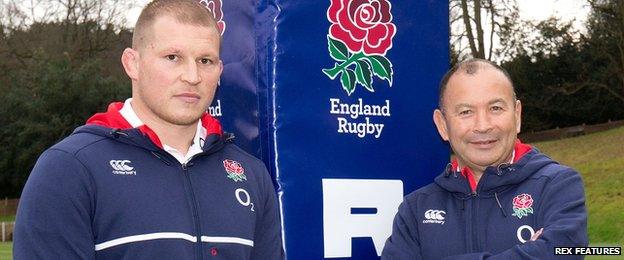
Dylan Hartley (left) missed the World Cup after a ban for head-butting
Stuart Lancaster, Eddie Jones' predecessor as head coach, called up nine uncapped players to his first squad, so the Australian's promotion of seven fresh faces was perhaps not as revolutionary as it felt at the time.
Instead, it was removing the captaincy from the dependable Chris Robshaw and handing it to Dylan Hartley - who had already served more than a year of bans for various acts of on-field violence before his latest indiscretion - that established the new regime's modus operandi.
Where Lancaster had spoken of his players being "ambassadors",, external Jones introduced Hartley praising his "passion", "aggression" and "uncompromising approach".
A wretched World Cup campaign had revealed England's soft underbelly. By promoting Hartley, Jones gave his side a hard-nosed ideal to aspire to and the street smarts to succeed.
Former England hooker Brian Moore, writing in the Daily Telegraph,, external said: "Eddie Jones has identified something that had been obvious to many outside the England camp for a while - England work hard, give their all, but there is no edge.
"We're not talking about illegality, we're talking about the controlled belligerence that is the hallmark of players such as Eben Etzebeth, Ma'a Nonu and Scott Fardy."
14 February 2016: George shows the way
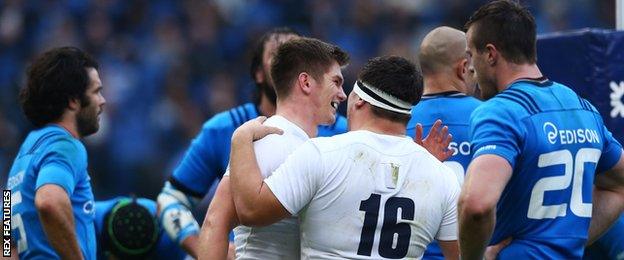
Owen Farrell (left) and Jamie George (right) are Saracens and England team-mates
For the first match and a half under Jones, England had been effective but not inspirational.
After scrapping their way to victory over Scotland in their Six Nations opener, the first half in Rome had been far from the St Valentine's Day massacre England fans might have hoped for under the new coach.
England had scored one try and led by a slender two points. But the second half saw a more ambitious, 15-man game emerge, with replacement hooker Jamie George's cutting angle and slick offload to Owen Farrell for the final try the clearest sign of Jones renewing England's licence to attack by instinct rather than the playbook.
"This is more like it, England cutting loose," enthused BBC commentator Eddie Butler as Farrell crossed.
Jones' England have now scored 46 tries in 13 games - an average of 3.5 a match, better than predecessors Lancaster (2.1), Martin Johnson (2.1), Brian Ashton (1.9) and Andy Robinson (2.9).
Highlights: Italy 9-40 England
27 February 2016: Farrell revels as midfield playmaker
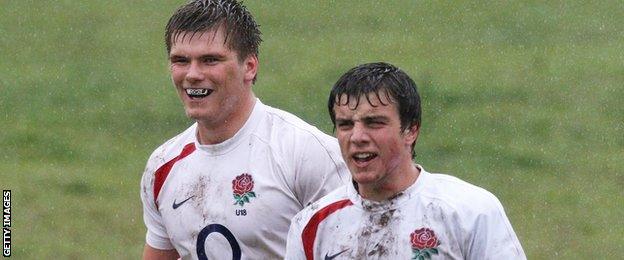
Farrell and Ford playing for England under-18s on tour in South Africa in 2009
Had Manu Tuilagi, or even Henry Slade, been fit then Farrell might never have got the chance to revive his partnership with George Ford.
As boys, they became neighbours when their fathers moved south to Saracens, and they played together in the street as well as at school and international age-grade level.
Under Lancaster, they had competed for the fly-half jersey, with the 12 slot reserved for blunderbus ball-carriers. Under Jones, Farrell was given the chance to show his craft could provide a more subtle midfield weapon, while offering a solid defensive presence as well.
The perfectly weighted miss-pass that picked off Robbie Henshaw's rush defence and opened Mike Brown's route to the line against Ireland was typical of the way he seized his chance.
Six Nations 2016: England 21-10 Ireland highlights
11 June 2016: Haskell thumps Pocock
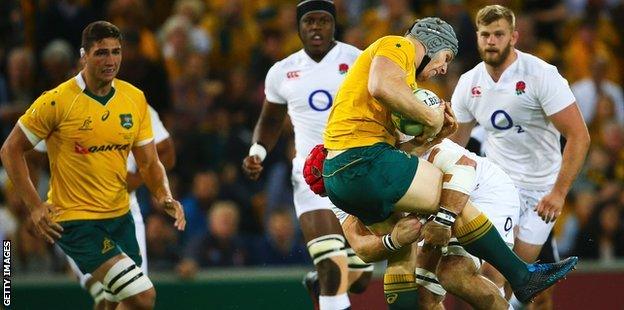
Haskell's huge tackle on Wallaby talisman David Pocock two minutes into the first Test set the tone for the entire series in June
During the 2015 World Cup - before he took the England job - Jones wrote a column for the Daily Mail lamenting the absence of a specialist open-side flanker in England's ranks., external
Robshaw was, he wrote, a "six and a half at best", unable to compete with the pace and breakdown skills of Australia's standard-bearer David Pocock.
James Haskell would not claim to be a traditional number seven either. But he has imposed himself with relentless industry and physicality.
His colossal hit on Pocock in the first two minutes of the first Test of the summer series against Australia set the tone for a bruising 39-28 win and showed how a perceived area of weakness had turned to a strength for England.
That it was Haskell - ebullient, driven, and not necessarily everyone's cup of tea - leading from the front was especially significant.
Marginalised under the Lancaster regime, Jones put him front and centre and gave him a very specific brief - smash everyone who comes near you, hammer every ruck you can, and run hard and straight when you get the ball.
The result? With his confidence high and a focused gameplan, Haskell was man of the series down under, despite injury forcing him out just after the hour mark of the second Test.
25 June 2016: Harrison is hauled off
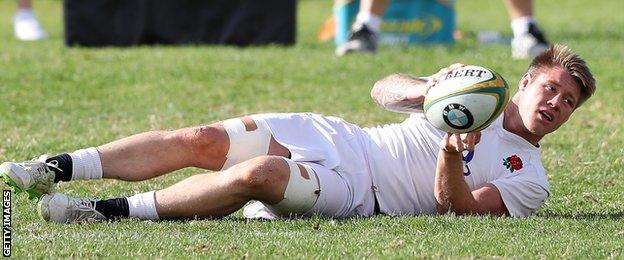
Teimana Harrison suffered the same fate that befell Luther Burrell in the first Test down under
Teimana Harrison's parents had flown over from New Zealand to see their son make only his second start for England, in the third Test in Sydney.
The match was only 31 minutes old when he was replaced in a tactical switch by Jones.
"I don't see it as a big deal," explained Jones when asked about the possible damage to the young flanker's confidence.
Jones was similarly blunt with defence coach Paul Gustard, telling him he "has got to get better".
All this in the wake of scoring 44 points to seal a historic whitewash in Sydney.
There is no concession to reputation or sentiment - either in public words or private decision-making - as Jones drives England on and up.
He is ruthless in pursuit of victory and more importantly, brutal as they may be, his tactical changes work, as the withdrawal of Luther Burrell in the first Test after half an hour in favour of Ford also demonstrated.
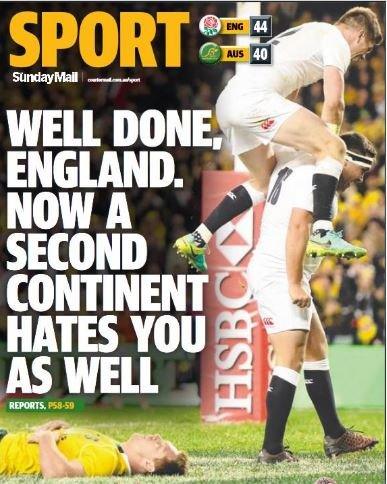
In the wake of Brexit, Australian newspaper the Courier Mail took England's first whitewash series win over Australia well...
26 November 2016: Daly sees red
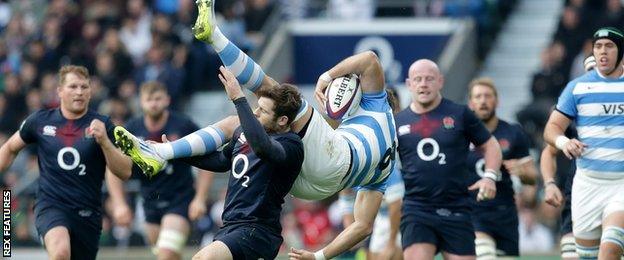
Daly was sent off for this tackle on Senatore
When Elliot Daly recklessly charged into the airborne Leonardo Senatore less than five minutes into England's autumn Test against Argentina, it set England an unexpected, but not unwelcome challenge.
Down to 14 men with 75 minutes to play, there was an immediate premium on discipline and defensive concentration.
After a nine-try demolition of Fiji the previous weekend, England had to think on their feet, adapt and survive to keep their winning run alive.
Argentina, while not in the form that carried them to the World Cup semi-finals in 2015, looked ominous as they moved to within two points early in the second half.
But England's composure and conditioning passed the examination in a 27-14 win.
It was a red letter day for England, one that showed them they could adapt to straitened circumstances on the fly and work out how to win despite the odds being stacked against them. In the future, this may be pin-pointed as the moment the team grew up.

Former England hooker and qualified solicitor passes judgement on the Daly incident
The dates that will define England's Six Nations
4 February: France at HQ
France were demolished 62-13 by the All Blacks at the 2015 World Cup, but gave the world champions a scare with a late fightback in Paris in November, coming up just short in a 24-19 defeat.
France have not won at Twickenham since 2005, however the mood takes their talented individuals they can poop any party.
11 February: Wales away
There were only tentative pokes - rather than the expected all-out verbal jousting - between Jones and Wales' counterpart Warren Gatland last year.
This time around, with Gatland on British and Irish Lions duty, it will be Rob Howley plotting England's downfall. Last time the interim head coach stepped up to the plate, he delivered in style with England sent spiralling to a 30-3 defeat in 2013.
18 March: Ireland in Dublin
The fixture list throws up a trip to Dublin on the final weekend for England - just at it did in 2011., external
England were on for a Grand Slam that year, but were on the wrong end of a 24-8 scoreline by the time the final whistle blew. After wins over the three southern hemisphere superpowers in 2016, Joe Schmidt's side will fear no-one.
- Published31 January 2017
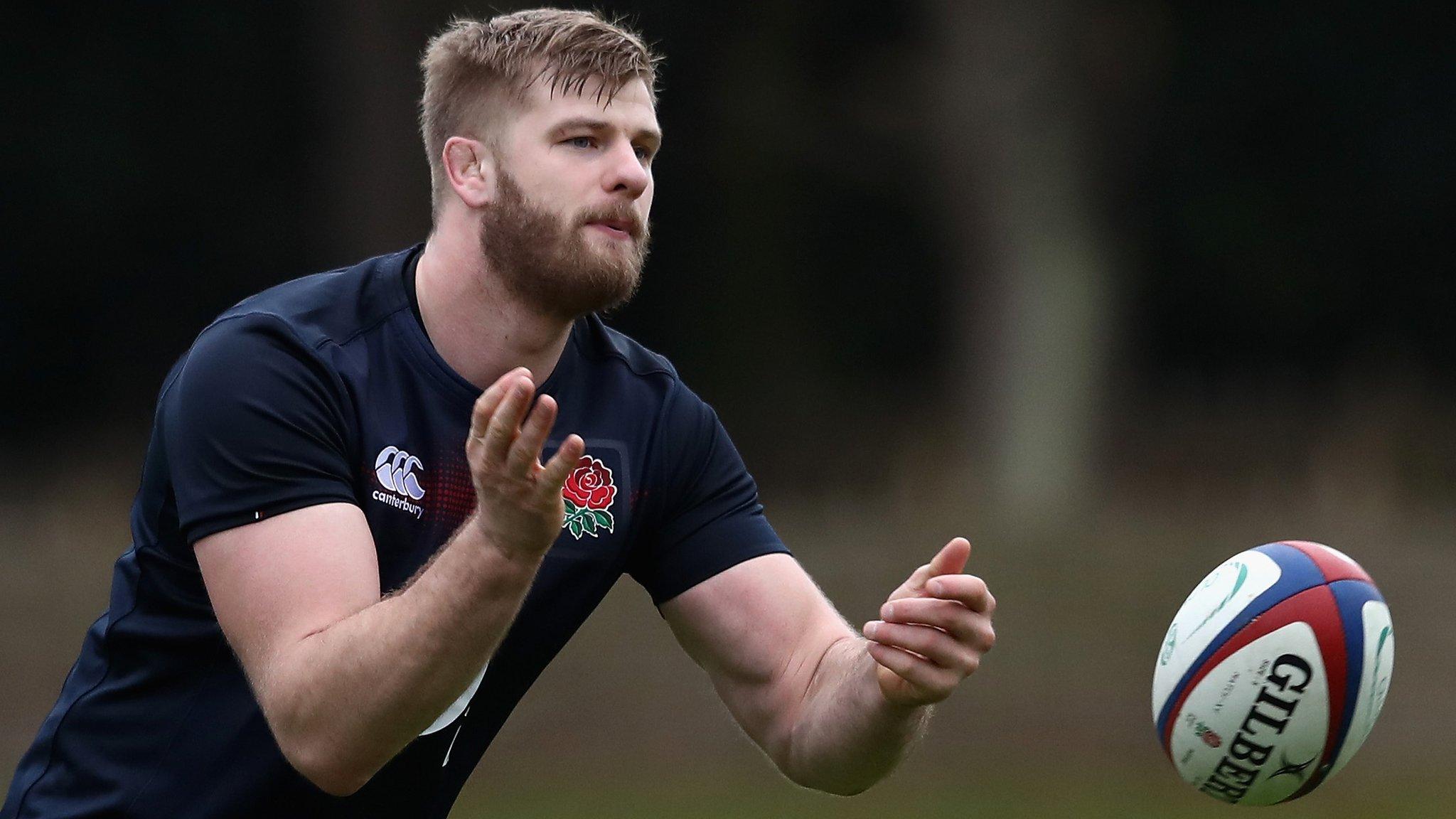
- Published17 March 2017
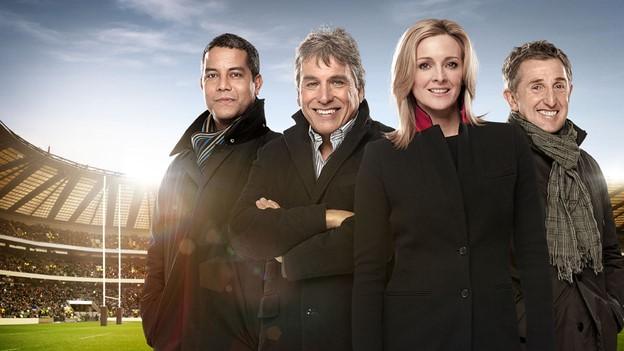
- Published4 February 2016
